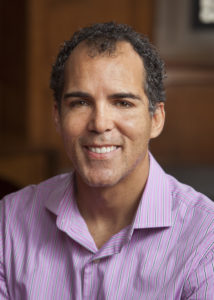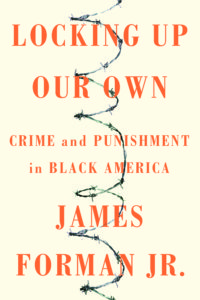
JAMES FORMAN Jr.
James Forman Jr. is one of the nation’s leading authorities on race, education, and the criminal justice system, and a tireless advocate for young people who others have written off.
Professor Forman attended Yale Law School, and after he graduated, worked as a law clerk for Justice Sandra Day O’Connor. After clerking, he took a job at the Public Defender Service in Washington, D.C., where for six years he represented juveniles and adults in felony and misdemeanor cases.
Professor Forman loved being a public defender, but he quickly became frustrated with the lack of education and job training opportunities for his clients. So in 1997, along with David Domenici, he started the Maya Angelou Public Charter School, an alternative school for dropouts and youth who had previously been arrested. The Maya Angelou school has been open for almost twenty years, and in that time has helped hundreds of vulnerable young people find a second chance, begin to believe in themselves, graduate, get jobs, and attend college.
Professor Forman started teaching law in 2003, and he currently teaches at Yale Law School, and this year is a Visiting Professor at Stanford Law School. Professor Forman teaches a course on Race and the Criminal Justice System and a clinic in which his students fight against the school to prison pipeline by representing young people facing expulsion from school for discipline violations. Last year he took his teaching behind prison walls, offering a seminar on criminal justice which brought together, in the same classroom, 10 Yale Law students and 10 men incarcerated in a CT prison.
Professor Forman has written many law review articles, in addition to pieces for the New York Times, the Atlantic Monthly, the New Republic, the Nation, and the Washington Post. His new book is titled Locking Up Our Own: Crime and Punishment in Black America.
WEBSITE: www.jamesformanjr.com
TWITTER: @JFormanJr
PUBLICATION:

In Locking Up Our Own, James Forman Jr. shows us that the first substantial cohort of black mayors, judges, and police chiefs took office amid a surge in crime and drug addiction. Many prominent black officials, including Washington, D.C. mayor Marion Barry and federal prosecutor Eric Holder, feared that the gains of the civil rights movement were being undermined by lawlessness―and thus embraced tough-on-crime measures, including longer sentences and aggressive police tactics. In the face of skyrocketing murder rates and the proliferation of open-air drug markets, they believed they had no choice. But the policies they adopted would have devastating consequences for residents of poor black neighborhoods.
A New York Times Book Review Editors’ Choice
A Washington Post Best Seller
REVIEWS:
“Best book I’ve read this year.” —Jennifer Senior of The New York Times on Twitter
“Superb and shattering . . . ‘How did a majority black jurisdiction end up incarcerating so many of its own?’ This is the exceptionally delicate question that [Forman] tries to answer, with exemplary nuance, over the course of his book. His approach is compassionate . . . The effect, for the reader, is devastating. It is also politically consequential . . . Locking Up Our Own is also very poignantly a book of the Obama era, when black authors like [Michelle] Alexander and Bryan Stevenson and Ta-Nehisi Coates initiated difficult conversations about racial justice and inequality.” —Jennifer Senior, The New York Times
“Timely . . . A masterly account of how a generation of black elected officials wrestled with recurring crises of violence and drug use in the nation’s capital . . . A big deal and a major breakthrough . . . Forman’s novel claim is this: What most explains the punitive turn in black America is not a repudiation of civil rights activism, as some have argued, but an embrace of it . . . Locking Up Our Own compel[s] readers to wrestle with some very tough questions about the nature of American democracy and its deep roots in racism, inequality and punishment . . . [Forman shows] that the solution will lie not only with policy changes but with individual changes of heart, too.” —Khalil Gibran Muhammad, The New York Times Book Review
“Revelatory . . . As Forman reminds his readers, black people have long been vigilant, often to no avail, about two kinds of equality enshrined in our nation’s ideals: equal protection of the law, and equal justice under the law . . . Locking Up Our Own is a well-timed, nuanced examination of the past . . . [and] makes a powerful case that the African American community was instrumental in creating a monster. We should be grateful that the same community . . . is leading the fight to take the monster down.” —Paul Butler, The Atlantic
“Poignant and insightful . . . Forman deftly moves between . . . examples of black community support for a law-and-order crackdown and the dire present-day consequences of our increasingly punitive and aggressive war on crime . . . Timely and important.” —Richard Thompson Ford, San Francisco Chronicle
“Eloquent . . . A gritty, often revelatory work of local history, interspersed with tales of Forman’s experiences as a public defender . . . Locking Up Our Own is a sobering chronicle of how black people, in the hope of saving their communities, contributed to the rise of a system that has undone much of the progress of the civil rights era. But, as Forman knows, they could not have built it by themselves, and they are even less likely to be able to abolish it without influential white allies, and dramatic reforms in the structure of American society.” —Adam Shatz, London Review of Books
“A breakthrough . . . very engaging and lucidly written.” —Andy Martin, The Indepedent (London)
“[Forman] offers an insightful history of black American leaders and their struggle to keep their communities safe from police and criminals alike . . . From both these personal experiences and the history that helped shape them, Forman uncovers the black community’s role in waging wars on crime and drugs.” —Matt Ford, The Atlantic
“A sharp analysis . . . Forman shows how our nation has gotten to the point where so many citizens—primarily blacks—are imprisoned . . . Writing with authority and compassion, the author tells many vivid stories of the human toll taken by harsh criminal justice policies. He also asks provocative questions . . . Certain to stir debate, this book offers an important new perspective on the ongoing proliferation of America’s ‘punishment binge.'” —Kirkus Reviews (starred review)
“James Forman Jr. masterfully explores why so many African Americans supported tough criminal laws over the past fifty years, and why, more recently, their attitudes began to shift. Combining dramatic stories from his work as a public defender with original historical research, Forman uncovers mass incarceration’s hidden history while documenting its human cost. Beautifully written, powerfully argued, and, most of all, deeply empathetic, Locking Up Our Own should be read by everybody who cares about race and justice in America.” —Van Jones, author of The Green-Collar Economy and Rebuild the Dream
“An absolutely essential read for anyone who wants to understand the politics of crime, race, and incarceration.”—Chris Hayes, host of All In with Chris Hayes and author of A Colony in a Nation
“Locking Up Our Own is an engaging, insightful, and provocative reexamination of over-incarceration in the black community. James Forman Jr. carefully exposes the complexities of crime, criminal justice, and race. What he illuminates should not be ignored.” —Bryan Stevenson, author of Just Mercy and founder of the Equal Justice Initiative
“James Forman Jr.’s frank and necessary history rings with the authentic voices of black Americans. By paying close attention to local conditions, he shows how well-meaning reforms snowballed into steadily harsher criminal justice policies in Washington, D.C. This is a very valuable and fascinating book—highly readable, engaging, and resolutely accurate about the urban realities it depicts. I recognized this world.” —Jill Leovy, author of Ghettoside: A True Story of Murder in America
“Locking Up Our Own is a pathbreaking examination of the ways that, over the past half century, African American policymakers, social justice activists, jurists, prosecutors, police officials, and ordinary folk have thought about and grappled with the administration of criminal justice. It is vivid, accessible, and full of illuminating insights. It is a brilliant distillation of deep research, disciplined thoughtfulness, and moral passion. In ongoing discussions about crime and justice in America, particularly its racial dimensions, no book will be more essential than Locking Up Our Own.” —Randall Kennedy, Michael R. Klein Professor of Law at Harvard Law School and author of For Discrimination and Race, Crime, and the Law
“James Forman Jr. tells the fascinating story of mass incarceration from the ground up. We see the heartbreaking stories of young people whose life prospects are diminished through tough-on-crime policies, the leaders in the black community whose limited choices led to support for harsh punishments, and the ways in which the legacy of racism still frames outcomes in the twenty-first century. Locking Up Our Own helps us to understand how the prison population exploded and what we need to do to create a more compassionate approach to crime and justice.” —Marc Mauer, Executive Director of The Sentencing Project and author of Race to Incarcerate
YOUTUBE:
